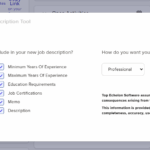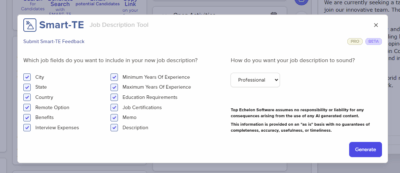Deciding on a career in Human Resources (HR) can be a daunting task. There are many factors to consider, including your personal interests, strengths, and goals. In this blog post, we will discuss some tips for deciding if a career in HR is right for you.
In fact, below are eight tips for deciding if HR is right for you:
Tip #1: Understand the role of HR.
Before deciding whether a career in Human Resources is right for you, it’s essential to understand the role of HR and what it entails. HR is a vital function in any organization, responsible for managing the organization’s human capital and ensuring that employees are engaged, productive, and satisfied in their work. HR professionals play a critical role in shaping organizational culture, driving employee engagement, and promoting organizational success.
To be successful in HR, you need a diverse set of skills and knowledge. These include strong communication skills, an understanding of employment laws and regulations, knowledge of HR best practices, and the ability to build strong relationships with employees, managers, and executives. You should also have a passion for helping others and making a positive impact on the organization’s success.
HR professionals have a range of responsibilities, including recruitment and selection, compensation and benefits management, performance management, employee relations, and talent development. They work closely with employees, managers, and executives to develop and implement HR policies and procedures that align with the organization’s goals and objectives. HR professionals also play a critical role in promoting diversity, equity, and inclusion in the workplace.
If you’re considering a career in HR, it’s essential to do your research and understand the role thoroughly before making a decision. Talk to HR professionals, read industry publications, and attend networking events to get a sense of what it’s like to work in HR. Consider taking courses or obtaining certifications to develop the skills and knowledge you need to be successful in HR.
Understanding the role of HR is essential before deciding whether a career in HR is right for you. HR is a dynamic and critical function in any organization, and it requires a diverse set of skills and knowledge to be successful. By researching the role of HR, talking to HR professionals, and developing your skills and knowledge, you can determine whether a career in HR is the right choice for you.
Tip #2: Consider your strengths and interests.
When considering a career in Human Resources, it’s crucial to reflect on your strengths and weaknesses to determine whether this career path is the right fit for you. HR is a dynamic and challenging field that requires a diverse set of skills and abilities. By understanding your strengths and weaknesses, you can determine whether you have the skills and characteristics needed to succeed in HR.
One of the critical skills needed for success in HR is strong communication skills. HR professionals must be able to communicate effectively with employees, managers, and executives, as well as outside vendors and stakeholders. If you have excellent communication skills and enjoy building relationships with others, a career in HR could be an excellent fit for you.
HR also requires strong organizational skills, as HR professionals must manage a range of tasks and responsibilities, including recruitment and selection, benefits management, and talent development. If you excel at multitasking, prioritizing tasks, and staying organized, a career in HR could be a good choice.
Another essential characteristic for success in HR is a passion for helping others. HR professionals play a critical role in supporting and developing employees, and they must be committed to making a positive impact on employees’ lives. If you have a passion for helping others and making a difference in people’s lives, a career in HR could be a fulfilling choice.
It’s also essential to consider your weaknesses when determining whether a career in HR is right for you. For example, if you struggle with conflict resolution or are uncomfortable addressing sensitive issues with employees, HR may not be the best fit. However, if you are willing to develop these skills and work to overcome your weaknesses, a career in HR could still be a viable option.
Considering your strengths and weaknesses is crucial when determining whether a career in HR is right for you. HR requires a diverse set of skills and characteristics, including strong communication skills, organizational skills, and a passion for helping others. By understanding your strengths and weaknesses, you can determine whether you have the necessary skills and characteristics to be successful in HR.
Tip #3: Research different HR roles.
It’s crucial to research different HR roles and understand the responsibilities and requirements of each. HR is a broad field with many different roles, ranging from entry-level positions to senior management positions. By researching different HR roles, you can determine which role aligns with your skills, interests, and career goals.
One of the most common entry-level HR roles is HR coordinator or HR assistant. In this role, you will support the HR team with administrative tasks, such as scheduling interviews, managing employee records, and organizing employee events. This role is an excellent starting point for those interested in pursuing a career in HR, as it provides a broad overview of HR functions and processes.
Another entry-level HR role is recruiter. Recruiters are responsible for finding and hiring new employees for the organization. They may work with hiring managers to create job descriptions, source candidates, conduct interviews, and make job offers. This role requires excellent communication skills, attention to detail, and the ability to multitask.
More experienced HR professionals may pursue roles such as HR manager or director. In these roles, you will be responsible for developing and implementing HR policies and strategies that align with the organization’s goals and objectives. You will also oversee HR functions such as recruitment, employee relations, and talent development. These roles require strong leadership skills, strategic thinking, and the ability to manage and motivate teams.
Researching different HR roles is essential when considering a career in HR. HR is a broad field with many different roles, and by understanding the responsibilities and requirements of each role, you can determine which role aligns with your skills, interests, and career goals. Consider talking to HR professionals, attending networking events, and reading industry publications to learn more about different HR roles and determine which role is right for you.
Tip #4: Network with HR professionals.
Networking with HR professionals is an excellent way to gain insights into the field and determine whether a career in Human Resources is right for you. HR professionals can provide valuable information about their experiences, share advice on breaking into the field, and offer guidance on the skills and characteristics needed for success in HR.
One way to network with HR professionals is to attend industry events, such as conferences, seminars, or webinars. These events provide opportunities to meet and connect with HR professionals, learn about emerging trends and best practices in HR, and gain exposure to different HR roles and organizations.
Another way to network with HR professionals is to join professional organizations or associations, such as the Society for Human Resource Management (SHRM). These organizations offer networking events, professional development opportunities, and access to industry publications and resources.
You can also network with HR professionals by reaching out to them directly. Consider connecting with HR professionals on social media platforms such as LinkedIn or Twitter. You can also reach out to HR professionals in your network or alumni from your university who work in HR.
When networking with HR professionals, be sure to ask questions about their experiences, career paths, and the skills and characteristics needed for success in HR. This information can help you determine whether HR is the right career path for you and provide insights into how to break into the field.
Networking with HR professionals is an essential step when considering a career in HR. HR professionals can provide valuable insights into the field, offer guidance on the skills and characteristics needed for success, and provide advice on breaking into the field. Consider attending industry events, joining professional organizations, and connecting with HR professionals directly to gain insights into the field and determine whether a career in HR is right for you.
Tip #5: Gain experience in HR.
Gaining experience in Human Resources before deciding whether it is the right career path for you is essential. Not only does experience give you a better understanding of the field, but it also helps you develop the necessary skills and competencies to be successful in HR.
One way to gain experience in HR is to look for internships or entry-level positions in the field. These positions offer hands-on experience in areas such as recruitment, employee relations, and benefits administration. They also provide exposure to different HR functions and allow you to develop essential skills such as communication, problem-solving, and attention to detail.
Another way to gain experience in HR is to take on HR-related projects in your current role. If you are in a non-HR role, consider volunteering to work on HR-related initiatives, such as employee engagement surveys or training programs. This experience can help you develop a better understanding of HR functions and demonstrate your interest in the field.
Consider also pursuing HR certifications, such as the Professional in Human Resources (PHR) or the Society for Human Resource Management Certified Professional (SHRM-CP). These certifications demonstrate your knowledge and understanding of HR functions and can help you stand out in a competitive job market.
When gaining experience in HR, it’s important to seek out a variety of experiences and roles. This can help you determine which areas of HR you enjoy and excel in and which areas you may need more development.
Gaining experience in HR before deciding whether it is the right career path for you is crucial. Consider internships, entry-level positions, HR-related projects, and certifications to gain hands-on experience and develop the necessary skills to be successful in HR. Seek out a variety of experiences to gain exposure to different HR functions and determine which areas you enjoy and excel in.
Tip #6: Consider the education and training required.
Considering the education and training required is an important step when deciding if a career in Human Resources is right for you. HR is a complex and constantly evolving field that requires a combination of knowledge, skills, and competencies.
Most HR roles require a bachelor’s degree, and some may require a master’s degree in HR, business administration, or a related field. Additionally, HR certifications such as the Professional in Human Resources (PHR) or the Society for Human Resource Management Certified Professional (SHRM-CP) may also be preferred or required by employers.
In terms of training, HR professionals are responsible for staying up-to-date on laws and regulations related to employment, such as labor laws, anti-discrimination laws, and health and safety regulations. This requires ongoing training and development to ensure that HR professionals are knowledgeable about changes and updates in the field.
Moreover, HR professionals should possess skills such as communication, problem-solving, critical thinking, and attention to detail. These skills can be developed through courses, workshops, and training programs that focus on HR-related topics such as recruitment, employee relations, benefits administration, and performance management.
When considering the education and training required for HR, it is important to evaluate your current level of education and determine whether additional education or training is needed to pursue a career in HR. Consider reaching out to HR professionals, attending industry events, and researching educational programs and training opportunities to gain a better understanding of the education and training required for HR.
Considering the education and training required is an essential step when deciding if a career in HR is right for you. A bachelor’s degree, ongoing training and development, and HR certifications may be required or preferred by employers. Possessing skills such as communication, problem-solving, critical thinking, and attention to detail is also essential for success in HR. Consider evaluating your current level of education, researching educational programs and training opportunities, and seeking advice from HR professionals to determine whether a career in HR is the right fit for you.
Tip #7: Evaluate the job market
Evaluating the job market is an important step when deciding if a career in Human Resources is right for you. The job market for HR professionals varies depending on industry, location, and economic factors, so it’s crucial to assess the demand for HR roles in your desired location and industry.
One way to evaluate the job market for HR is to research job postings and industry trends. Look at job postings in your desired location and industry to determine the demand for HR roles and the skills and qualifications required. Consider the number of job postings, the types of roles available, and the salaries offered to gain a better understanding of the job market.
Additionally, consider networking with HR professionals in your desired industry and location. Attend industry events, connect with HR professionals on LinkedIn, and seek out informational interviews to gain insight into the job market and the skills and qualifications needed to succeed in HR.
Another factor to consider is the potential for career growth in HR. Research the career paths available in HR and the opportunities for advancement within the field. Consider factors such as job titles, responsibilities, and salaries to determine whether there is potential for long-term career growth.
Evaluating the job market is an important step when deciding if a career in HR is right for you. Research job postings and industry trends, network with HR professionals, and consider the potential for career growth to gain insight into the job market and the skills and qualifications needed to succeed in HR. By evaluating the job market, you can make an informed decision about whether a career in HR is the right fit for you.
Tip #8: Consider your long-term career goals.
Considering your long-term career goals is an essential step when deciding if a career in Human Resources is right for you. HR offers a wide range of roles and career paths, and it’s important to evaluate your long-term goals to determine whether a career in HR aligns with your aspirations.
First, consider your interests and strengths. HR roles vary in responsibilities and focus areas, including recruitment, employee relations, compensation and benefits, and talent management. Evaluate your strengths and interests to determine which HR roles may be the best fit for you.
Second, consider your long-term career goals. Do you aspire to become an HR manager, director, or executive? Are you interested in a specific industry or organization? Understanding your long-term goals can help you identify the skills, experiences, and qualifications needed to succeed in your desired HR role.
Third, consider the potential for career growth and advancement in HR. Evaluate the career paths available in HR and the opportunities for growth and advancement within your desired industry or organization. Determine the skills and experiences needed to advance in your career, and seek out opportunities to develop those skills.
Consider the alignment between your long-term career goals and the values and culture of the organization or industry you are interested in. Evaluate whether the organization’s values and culture align with your personal values and goals, and whether the organization offers opportunities for career growth and advancement.
Considering your long-term career goals is an essential step when deciding if a career in HR is right for you. Evaluate your interests and strengths, determine your long-term career goals, consider the potential for career growth and advancement, and evaluate the alignment between your goals and the values and culture of the organization or industry you are interested in. By considering your long-term career goals, you can make an informed decision about whether a career in HR is the right fit for you.








